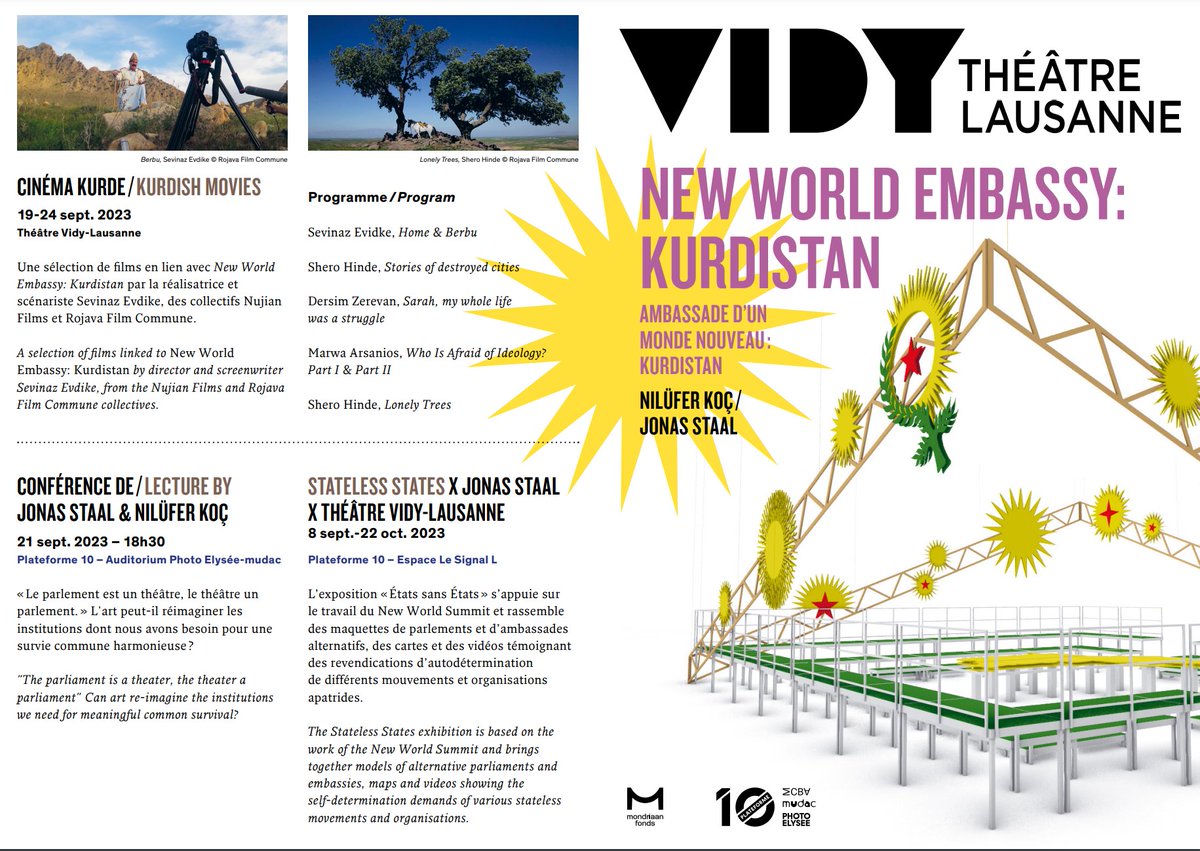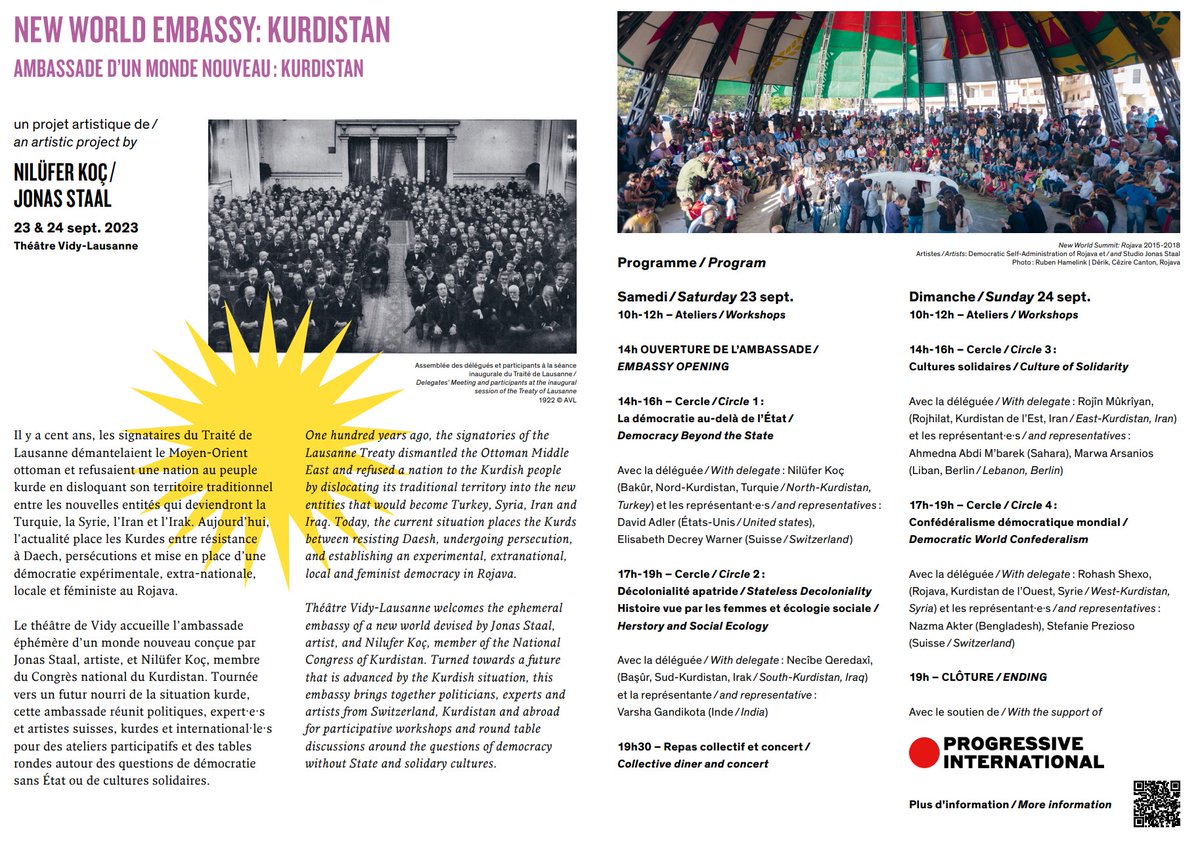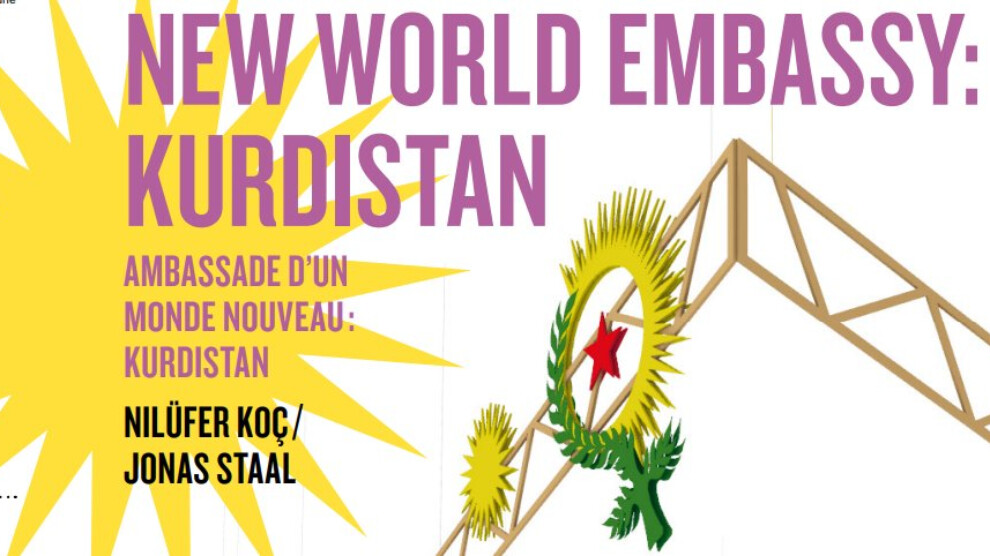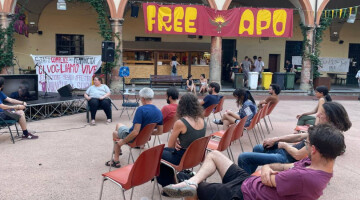From September 23 to 24, 2023, the Vidy Lausanne theater will host the 'ephemeral embassy of a new world' centered on Kurdistan, as part of the commemorations of the Treaty of Lausanne which carved up Kurdistan and opened the way to the physical, linguistic and cultural genocide of the Kurds.
Turned towards a future that is advanced by the Kurdish situation, it has been devised by the artist Jonas Staal and Nilufer Koç, a member of the National Congress of Kurdistan.
The program includes a selection of movies chosen by Serekaniye director Sevinaz Evdike, as well as 4 workshops to provide an opportunity to present the speakers, their campaigns, their challenges and their current methods, in order to prepare participants for the diplomatic circles in the afternoon.
Each afternoon, two diplomatic circles will bring together a Kurdish delegate, a representative of an international organisation and a Swiss expert. Together, drawing inspiration from ecological and feminist initiatives in Kurdistan, they will discuss and imagine with the audience what it means to have a democracy beyond the State, a stateless decoloniality, the need for cultures of solidarity or the possibility of a global democratic confederalism.

One hundred years ago, the signatories of the Lausanne Treaty dismantled the Ottoman Middle East and refused a nation to the Kurdish people by dislocating its traditional territory into the new entities that would become Turkey, Syria, Iran and Iraq. Today, the current situation places the Kurds between resisting Daesh, undergoing persecution, and establishing an experimental, extranational, local and feminist democracy in Rojava. Vidy welcomes the ephemeral embassy of a new world, which will host participative workshops, films and round table discussions that will bring together politicians, experts and artists around the questions of democracy without State and solidarity cultures. The Kurds are currently caught between resistance to Daech, persecution and the establishment of an experimental, extra-national, local and feminist democracy in Rojava (West-Kurdistan, Syria).

New World Embassy: Kurdistan is an artistic project by Nilüfer Koç of the Kurdistan National Congress (KNK) and artist Jonas Staal. It takes the form of a large scale installation that will operate for two consecutive days as an alternative embassy for the Kurdish peoples, which today find themselves under occupation of four different nation-states: Bakur (North-Kurdistan, Turkey), Rojhilat (East-Kurdistan, Iran), Başȗr (South-Kurdistan, Iraq) and Rojava (West-Kurdistan, Syria).
The separation of historical Kurdistan can be traced back, in part, to the 1923 Treaty of Lausanne that was signed in Switzerland, which granted a majority of the Kurdish homeland to modern Turkey. Erecting this “stateless embassy” in Lausanne is thus an attempt to confront this historical injustice, but also to represent the alternative ideas of self-determination the Kurdish peoples developed in response to their occupation and separation. Revolutionary Abdullah Öcalan’s vision of a ”stateless democracy” for example, that critiques the patriarchal, nationalist and capitalist mentality of statehood, is today being practiced across different parts of Kurdistan, and can be considered an essential alternative to the crises of the interstate system.
Just as the Kurds have envisioned a “stateless democracy” so this embassy will operate as a “stateless embassy.” It prioritizes people’s diplomacy – cultural diplomacy – over state diplomacy, and gathers representatives from the different parts of Kurdistan, together with progressive politicians, Indigenous peoples, solidarity movements and cultural workers of all kinds. Together they discuss and imagine with the public what it means to separate the practice of democracy from the state, what a stateless decoloniality looks like in practice, the necessity of cultures of solidarity, and the possibility of a stateless world democracy.
The opening days of the New World Embassy: Kurdistan will host “diplomatic circles” that can be attended to in person or through livestream in the afternoons and evenings – both of which will be supported through trilingual Kurdish-French-English simultaneous translation. The diplomatic circles take the form of public gatherings in which stateless diplomats meet to explore to which extend stateless democracy can act as an alternative paradigm to face the present crises of rising authoritarianism, economic precarity and ecological collapse. These are followed by collective dinners with the public, that allow for more intimate exchanges and relationship building. The morning sessions of both days will allow members of the public to join intensive workshops on subjects such as communal self-governance, social ecology and stateless campaigning.
Around New World Embassy: Kurdistan, the theatre will be organising a programme of music by Kurdish artists and screening a selection of films. This aspect of 'cultural diplomacy' will provide an opportunity to learn more about the history of the Kurdish struggle and their alternative vision of a democracy without a state.
At the same time, Plateforme 10 will host Jonas Staal's exhibition Stateless States, which imagines a stateless global polity. Through architectural models of alternative embassies and parliaments, maps illustrating the self-determination claims of various stateless movements and videos, Stateless States seeks to liberate us from the traditional notion of the state in favour of a new stateless global culture.

















